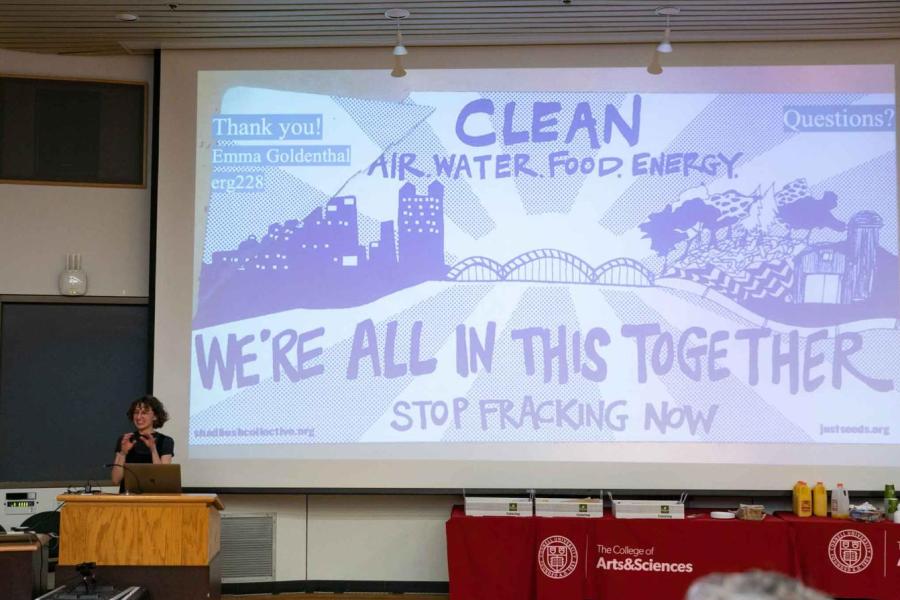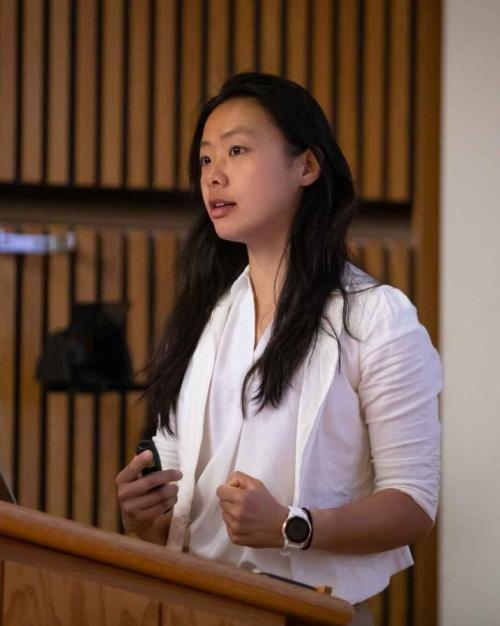Does activism around one local environmental issue cause people to become more active around climate issues in general? Is there discrimination at work in the verification process of some social media platforms? Do Asian Americans and African Americans have more empathy toward each other because they’ve both experienced unfair treatment?
These are some of the questions this year’s graduating class of Robert S. Harrison College Scholars have been studying since they were accepted into the program as sophomores. They presented their final theses during a daylong event May 7 in Goldwin Smith Hall, the culmination of their work as part of the selective program in the College of Arts & Sciences.
Harrison College Scholars design their own interdisciplinary majors, organized around a question or issue of interest, and pursue courses of study that cannot be found in an established major. They work closely with faculty and program advisers to choose their classes and design these independent senior projects.
“The class of ‘22 has done most of their honors thesis research in unprecedented times, during a global pandemic,” said Michael Goldstein, professor of psychology and director of the Harrison College Scholar program. “Their presentations clearly show that they succeeded — they found ways to do innovative and original research under these challenging conditions.”
The audience for the annual event includes the scholars, as well as their faculty advisors and family members or community members who have been involved in students’ research.
Emma Goldenthal ’22 presented her work in front of her parents and grandparents, as well as several local activists and county government representatives from the Town of Dryden in Tompkins County. Dryden’s 2011 fracking ban and its impacts on local activist networks and state politics were part of Goldenthal’s study.
For her project, Goldenthal interviewed 21 county residents and surveyed another 183 residents, who had a wide variety of levels of activism surrounding the fracking issue. She found a positive relationship between people’s activism related to fracking and their activism around other local issues down the road.
At the end of her project, Goldenthal developed suggestions for environmental activists and organizers concerned with sparking action on local environmental issues and climate change. She emphasized prioritizing action over attitude change, and the importance of social ties and community-building within movements.
“Dryden’s fracking ban was a successful instance of environmental action and what psychologists term ‘positive behavioral spillover,’” she said, but “it truly became an instance of ‘climate’ action when local movements shifted away from just saying ‘no’ to fracking, and started saying ‘yes’ to local renewable energy development, with benefits accessible to all.”
Anna Hu’s ’22 time at Cornell coincided with recent attacks on Asian Americans and the Black Lives Matter movement. She researched how the two groups have been allies at times throughout history.
Along with extensive historical research, Hu conducted an experiment with 672 Asian American participants, to gauge whether remembering a personal incident of discrimination would improve their attitudes or behavior toward African Americans. She actually discovered the opposite was true, at least in her study.
“This kind of political solidarity is often issue-contingent and fails when people who are experiencing discrimination realize how different they are,” she said. However, she ended her talk with some hopeful suggestions from the recent campus visit of Leymah Gbowee, winner of the 2011 Nobel Peace Prize, whose suggestions included keeping people at the center of the conversation.
Anuli Ononye ’22 also presented in front of her parents and grandparents, who traveled across the country to attend. She focused her work on social media verification, a process that Instagram and Twitter use to legitimize the accounts of some of their most popular content creators. Verified accounts are more trusted and more likely to be able to attract followers and advertisers, she said.
From interviews with creators, Ononye found that the process for verification is a closely guarded secret — they don’t know what criteria are necessary to receive it and they don’t understand why they are denied. They wonder if the process is done by a group of people or by an algorithm, she said. And many of them wonder if their race, ethnicity or the focus of their content might negatively impact their ability to get verified.
“Students on this campus, and most young adults really care about verification,” Ononye said. “But there’s a lot of dissatisfaction with the verification process.”
Other graduating Harrison College Scholars and their projects include:
- Vanessa Olguin: “Movement in a Warming World: The Implications of Anthropogenic Climate Change on Migration, Politics, and Policy”
- Benjamin Feldman: “Uplifting Lives and Building Trust: How Countries Break the Fragile State Cycle and Improve Governance”
- Lucy Dybner: “Pañuelos Entretejidos: Transmission as Potency in Argentina’s Feminist Fight for Abortion”
- Anjelika Amog: “Living and Dying in Madness and Mourning Still: Narrativizing Grief, Memory, and Trauma”
- Luke Aslanian: “The Grim Reader: Four Poignant Ways the Living Have Thought About Death and Interacted With the Dead”
- Jack McLeod: “Screenwriting for Social Impact”
- Lily Elkwood: “How Blockchain Will Affect the Key Players in the Art Market”
- Grace Tran: “Reimagining the Art Museum: Envisioning an Accessible & Socially Engaged Future for the Herbert F. Johnson Museum of Art”
- Sara Mills: “The Psychology of ‘Protest Music:’ The Rhetoric, Effectiveness, and Limitations of Countercultural Music”
- Amelia Clute: “Eat This, For This is My Body: Tlazolteotl and the Conflation of Digestion and Reproduction in Ancient Mesoamerica”
- Aliou K. Gresseau-Gambrél: “Gade Tèt Ou, Moom Sa Bopp”
- Alia Adler: “Examining the Effects of the Mid-Day Meal Scheme on Gender Inequality Through the Lens of International Development and Beyond”
- Dana Slayton: “‘Speak With Us, and Speak With Others’: Imagined Speech and Imagined Community in Coptic Language Revival Movements”





